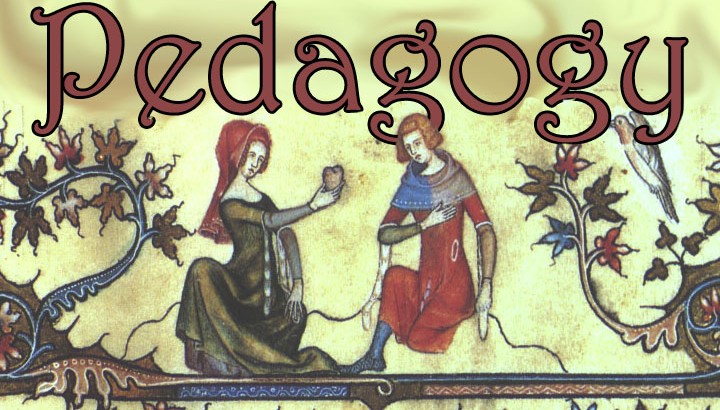by Carol L. Robinson
In my last post, regarding online pedagogy, I concluded with a question:
[…] how does one transfer a sense of community (instructor and students) from the space of the brick-n-mortar classroom to the space(s) of cyberspace, particularly when many of those spaces are little more than digital pages, including (in the case of my medieval literature class) facsimiles of medieval manuscripts? Instead of a managed learning system, in other words, I am all for a less managed (slightly chaotic) system of learning that is more connective with other communities.
Since posting this question, I have made several subjective conclusions, based upon teaching Medieval Literature fully online during this past semester (Fall 2014) at Kent State University. Now that the semester is over and I have recovered; now that I am getting to teach Literature in English I (British literature from the beginning to roughly 1800 CE), I am going to explore these concerns:
- THE ADVANTAGES OF CHAOS: Students hate chaos; they want everything to be extremely structured; they want the course to appear “simple” to them. I am not sure that this is a good thing. I do not mean that I think that students should have to struggle with the particulars of a course structure in order to learn its content, but I worry that a course structure can be laid out so simply that it causes the course content to also become too simple, reducing challenges for critical thinking and the development of other cognitive skills.
- THE DISADVANTAGES OF ACCESSIBILITY: One of the advantages of teaching medieval literature online (rather than on-land) is also one of its dangers. I am thinking of the accessibility issues, for everyone (not just those who suffer physical or sensory difficulties). It is wonderful, for example, that so many facsimiles, transcriptions, translations, audio recordings, videotaped readings/performances are so easily available online. However, I have always thought that part of the pleasure and cognitive development gained from studies, such as that of medieval literature, is in the exploration and discovery. It’s too much information with too much annotation, telling people what to think, instead of helping them to think for themselves. I worry, in other words, that the Information Age has caused such information to become so easily accessible that it has become, in a word, inaccessible.
- THE IMPORTANCE OF COMMUNITY: Interactivity is also a concern, as always. Accessibility is a fundamental component of building community, and by this I mean in terms of physical and sensory issues. It is a constant challenge to make an online course so that the structure is conducive to interactions between students as well as between students and the professor. My response has been to always have required participation in forums (discussion boards), and to also have at least two required online one-on-one (text chat) conferences with me. I prefer the text-chat because then students have notes from our discussion (saved chats). However, thinking of my #1 concern (above), and because the technology of video chats has significantly improved, I am considering requiring students to video chat (Skype, Facebook, Google Chat–whatever is easiest for them on their computers) with me. This would allow for a better workout for students with the reading aloud components of these classes. Last semester, I required students to either record themselves (and then email or otherwise share with me) or to call my office phone and leave a recording of their reading lines of Old English and Middle English as a part of their exams. It was awkward because they had to study recordings online by themselves, and there was not much opportunity for help from me prior to the exams. If we video chat, I can address that issue more directly. (By the way, my deaf students are never required to speak-read aloud; they are instead challenged with converting the Old or Middle English into correct and poetic ASL–which I admit is a challenge for me to evaluate, since ASL is not my own primary language; however, I think that it is an excellent lesson in linguistics and visual poetics.)
- THE NEED FOR MORE DIRECT INVOLVEMENT: I have always, ultimately, seen the development of online courses (especially as they are still “jailed” within the structures of information management systems such as Blackboard or Moodle), as in constant danger of becoming little more than highly technologically advanced multimedia texts. A text is not a course. In many ways, in other words, another advantage of an online course is also its disadvantage: it functions more like an individual investigation than like a class; it requires more independent learning than leadership by an instructor. In terms of accessibility and exploration, then, such is not structured too simply (contrary to what I argued above). However, in order to make it a genuine course (rather than an individual/independent investigation), more has to be added to the simple structure. Now I have to rant for a moment: I hate it (just hate, hate, hate it) when colleagues argue that online instructors have it “easy” because they just build their classes and then grade the results. First of all, building a high quality (high in content, high expectations) course is a lot of work (both technologically and pedagogically). Second, an instructor needs to have the course fully built (and sometimes I like to make the entire semester’s course fully accessible, so that students can work ahead, if they are so inspired) at the start of the semester because then they can spend the semester, not only evaluating, but interacting with students. There is, clearly, an exhaustion factor here, for the instructor, as well as the (obvious?) technological challenges. I think, however, that the advantage of teaching online is that smaller group and individual work with instructors, via text chat (and group text chat) and video chat (and group video chat) offer a great deal of delightful possibilities.
This is some of what I plan to explore this semester.

